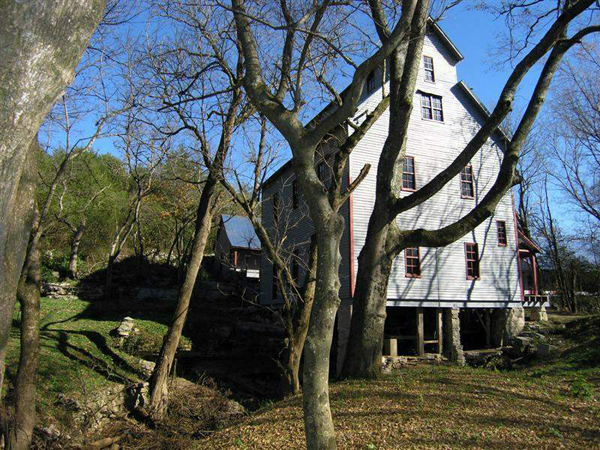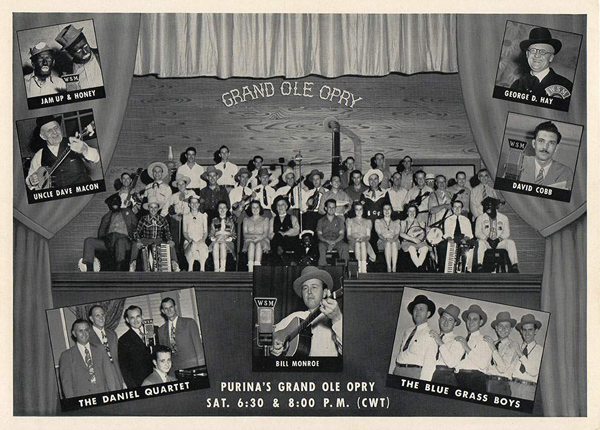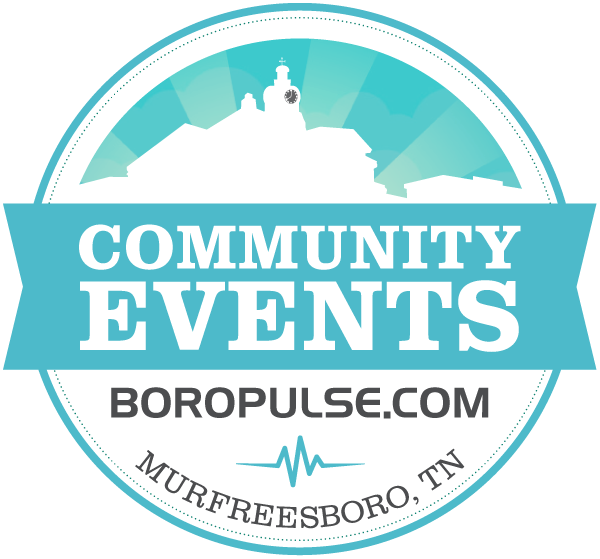
Readyville Mill, a symbol of rural days gone by, where Uncle Dave Macon would sit on the porch and play for his friends and neighbors even after becoming the Opry’s first superstar.
For days, 7-year-old Hank had patiently waited for this moment. Papa had promised to take him to the grist mill for the first time. At last, the day had finally arrived. With the spring wagon heavily loaded with burlap sacks of shelled corn, Papa and Hank began their journey to the mill.
A whirling kaleidoscope of color surrounded them—scarlet, yellow, russet and brown. Along the way were gardens and fields which once flourished with summer’s crop. The autumn rains had clothed them with blessings. Their bounty now lay in dry heaps in corners beside the fences. Visible were swaths of golden wheat standing in stately bundles, stretching across the farmland.
The wagon’s wooden boards creaked as Ole Gray pulled the burdensome load down the lane and over a stone bridge. The small stream below was choked with thousands of fallen leaves. Tiny leaves continued to tumble down as a crisp, fresh wind continued to blow them silently onto the water.
This had not been a particularly good year for growing corn. After the corn had been planted in the spring, there had been continuous rain for days. In July, the weather turned hot and dry, so the harvest was small this year. Papa decided to take this opportunity to teach a life lesson.
“Son, I must tell you that this has been a hard year. There simply wasn’t a large amount of corn to harvest! No matter, I want you to know that regardless, we must be grateful. Do you understand that?”
“No, Papa, I really don’t. Why should we be thankful when there isn’t a lot of corn for us?”
“Hank, it’s like this . . . a thankful attitude keeps you happy no matter what happens around you. You can always find something to be thankful for even when life doesn’t turn out like you want. Like right now, I’m grateful for the chance to be with you enjoying God’s beautiful creation.
Startling both, suddenly a wild turkey scampered hastily across the road into a grove of trees where two squirrels scampered playfully over the dry leaves. Watching all this activity motivated Papa to continue,
“Have you ever thought? God’s creatures don’t worry. They just know instinctively that God is going to provide. As humans, it is more natural to trust in our own ability rather than God’s and that, son, will only make us unhappy.”
Seemingly Hank began to understand Papa’s lesson, “I think I get it, Papa. No matter what, God will take care of us, right? We just have to trust.”
As they finally arrived at the grist mill located at the fork of the river, Papa felt he had connected with his son. While Papa greeted the miller, his young son with “good intentions” began clumsily, unloading the huge bags of corn. Soon their labors would be rewarded with the corn hand-bagged into bushels. With sacks of freshly, ground corn meal, Papa and Hank began their trip back to the farm.
All across Middle Tennessee, early settlers constructed grist and saw mills along rivers and streams. It was a thriving enterprise when commerce was primarily agriculture. As Papa’s wagon rolled through a cathedral-like canopy of golden oak, hickory and ash, the beauty of autumn splendor and this simple yet profound moment for all would be swept away like dry leaves across the landscape.
While America was clinging to its rural roots, George D. Hay began providing old-time folk music programming on Nov. 28, 1925. Noting the favorable response to earlier WSM performances of old-time artists like Dr. Humphrey Bate, Uncle Jimmy Thompson and Uncle Dave Macon, Hay decided to expand his audience into the rural South.

An advertisement featuring the stars of the Grand Ole Opry in the 1940s. George D. Hay, founder of the Opry, appears at the top right. Note a very young Bill Monroe with the Blue Grass Boys. Jam Up and Honey was a comedy act that would be very offensive in today’s culture.
When he sat Uncle Jimmy Thompson down in front of a WSM microphone there were many skeptics, including the program’s main sponsor, the reluctant National Life and Accident Insurance Company in Nashville. Although Uncle Jimmy’s performance had not been formally promoted or advertised, the switchboards lit up and telegrams and letters started pouring into the station, many requesting more of the old-time familiar tunes. The reaction to Uncle Jimmy was extensive and dramatic, convincing the skeptical that this type of programming was what the audience wanted. The people wanted the music that they had heard all their lives. It was not until late December that Hay decided to make this announcement:
Because of this recent revival in the popularity of familiar tunes, WSM has arranged to have an hour or two every Saturday night, starting December 26.
Hay’s vision echoed a sentiment familiar to most Americans of the day. However, his vision for the Opry had not been linked to the quest for the simpler side of life or a preserver of American folk culture until the rural-based radio show was firmly established as an institution. In his own book written in mid-1940, Hay writes:
Radio station WSM discovered something very fundamental when it tapped into the vein of American folk music which lay smoldering and in small flames for about three hundred years. After all, we try to keep the Opry homey . . . many of the geniuses some from simple folk who adhere to the fundamental principles of honesty included in the Ten Commandments. The Grand Ole Opry expresses these qualities from these good people.
In his documentation, he refers to two of America’s oldest tunes played by his artists—“Pop Goes the Weasel!” and Turkey in the Straw,” songs that had been passed down orally from their Scotch/Irish traditions through the generations. Hay began to deliberately exploit the hillbilly image on the Opry. He understood more than most how songs were transmitted through the culture at barn dances, parlors and front porches across the rural South.
An early press release containing Hay’s first public statement about old-time music, released on Dec. 27, 1925, touted upcoming performances by Uncle Jimmy Thompson and Uncle Dave Macon:
Old tunes, like old lovers, are the best, at least judging from the applause which the new Saturday night feature station WSM receives from its listeners in all parts of the country; jazz has not completely turned the tables on such tunes as “Pop Goes the Weasel!” and “Turkey in the Straw.” America may not be swinging its partners at a neighbor’s barn dance but it seems to have the habit of clamping on its ear phones and patting its feet as gaily as it ever did when old-time fiddlers got to the swing.
His attempt to use the Opry to rusticate using the hillbilly image was fully entrenched by the 1930s. As America was struggling to recover from the economic disaster created by the effects of the Great Depression, most wanted to romanticize rural life and go back to the simpler things of life. The early Opry shows and the hoedown band performers echoed that sentiment, reflecting the return to values that made the country great.
The Grand Ole Opry (then called the WSM Barn Dance) was purposely structured as an old-time music show to be broadcast regularly on WSM. It has become the longest-running radio broadcast in U.S. history, dedicated to honoring country music and its history. The Opry showcases a mix of legends and contemporary chart-toppers performing country, bluegrass, folk, gospel, and comedic performances and skits.
The Grand Ole Opry is considered an American icon, attracting hundreds of thousands of visitors from around the world and millions of radio and Internet listeners. The Opry’s current primary slogan is “The Show that Made Country Music Famous.” Other slogans include “Home of American Music” and “Country’s Most Famous Stage.”
In the 1930s, WSM and its sponsor could not keep up with the show’s growing popularity. The Opry management began hiring professionals and expanded the show to four hours. WSM radio, broadcasting by that time with 50,000 watts, made the program a Saturday night musical tradition in nearly 30 states. In 1939, the show debuted nationally on NBC Radio. The Opry moved to a permanent home, the Ryman Auditorium, in 1943. As it developed in importance, so did the city of Nashville. Nashville became America’s “country music capital.” The Grand Ole Opry holds such significance in Nashville that its name is included on the city/county line signs on all major roadways, which read “Music City | Metropolitan Nashville Davidson County | Home of the Grand Ole Opry.”
As in the days of the early Opry, we seem to travel down well-worn, deeply rutted roads, trudging along, aimlessly wandering and wondering. We have lost the practical benefits of a simplified life while we fixate compulsively about the next move. Somehow, all that confusion dissipates when we become sensitive to the eternal and to our Creator as fresh adventures emerge in this complex way of living.












